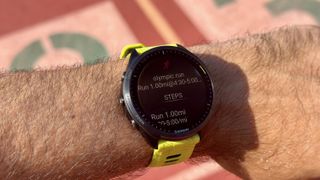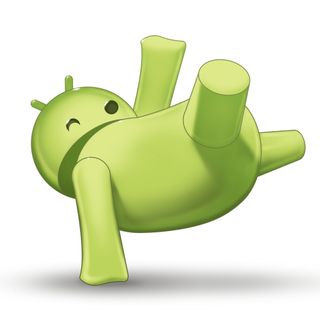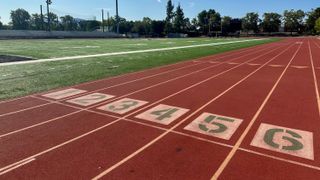Racing Olympians at home is hilariously impossible. Everyone should try it at least once
You know objectively how fast the Olympic track and field athletes are, but you won't *really* understand until you hit the track yourself.


In this weekly column, Android Central Wearables Editor Michael Hicks talks about the world of wearables, apps, and fitness tech related to running and health, in his quest to get faster and more fit.
No normal person would walk up to Noah Lyles or Sydney McLaughlin-Levrone and challenge them to a grudge match. It's obvious how fast and talented Olympic track and field athletes are, even compared to dedicated amateur athletes. But I still decided to "race" Olympians at my local track, and I have no regrets.
No, I don't have delusions of grandeur like people who challenge table tennis Olympians to matches and can't win a single point. But the way they film track events somehow feels so removed from reality. The camera floats far enough away that it looks like runners are gliding down their lanes, their forms so effortless. And the superstars make the non-qualifying runners look much slower than they are.
My new tradition around every Olympics or World Athletics Championship is to challenge the best athletes in the world and see how long I last, with a healthy dose of cheating. It's my personal equivalent to Leslie Jones trying to match Simone Biles with her living room floor routine.
Gotta clear space for that gold medal, baby! I’m coming for you, Paris. With a little help from @Google Gemini. #Google_Ad pic.twitter.com/nveuW1EnrkJuly 29, 2024
Here's a fun example: I couldn't jump hurdles when I was a fit high schooler and would die trying today. But could I beat McLaughlin in the 400m if they forgot to put hurdles in my lane? Hah, no: her world record is about 51 seconds. Even with my recent VO2 Max sprint training, my current lap ceiling is about 70 seconds.
I tried anyway! I went to my local track, did a quick warm-up, and pushed myself harder than I had in a long time. I ended up hitting my fastest lap time since my high school days.

My fastest-ever marathon is about twice as slow as Eliud Kipchoge ran the 2021 Tokyo Marathon to win gold. But when the Paris Marathon starts on August 10, how long could I keep up with the future gold medalist? Assuming he runs it at Kipchoge's 2:08 standard, I'd need to maintain a 4:55/mile pace.
So what did I do? I set up a workout on my Garmin Forerunner 965 with a 5:00/mile pace and an undetermined duration, and after warming up, I started sprinting around my local track, seeing how long I'd last! I ended up lasting two laps before I had to stop.
Be an expert in 5 minutes
Get the latest news from Android Central, your trusted companion in the world of Android
Of course, I'm not just focusing on household names and medalists. I like watching the Olympic trial events, waiting for the final time summary, and writing down the slowest runner's time. That runner failed to qualify and typically looks downright lethargic on TV compared to the medalists; then you try racing that inadequate time and realize how keeping pace with this failed Olympian would be an impossible nightmare after a couple of minutes.

Still, I was particularly inspired on Friday watching fellow Californian Grant Fisher score bronze in an epic Men's 10,000m final at 26:43, within half a second of Cheptegei's Olympic record.
I already know that's not a time I could ever reasonably approach, short of living at altitude, losing a bunch more weight, and dedicating my life to running. But that's not the point of this little game of mine.
I haven't run at a 1:04-lap pace in over a decade, though I could at least keep it up for 200m. Then I paused my workout — I imagined yelling at Fisher to pause the race for a minute while the Parisian crowd booed me — before running the second lap leg. Eventually, I plan to maintain that pace for longer.
And that's the point of this aspirational, delusional Olympic training. Outside of paid races, running is a lonely sport, and it's hard to stay motivated when your only goal is to "run fast." But if I have a concrete goal like "keep up with Grant Fisher for just one lap out of 25 laps," that makes my weekly anaerobic workouts that much more enjoyable.
Most fitness watches have robust workout-building tools and Track Run modes, so it should be easy for you to create a challenging run for yourself. Then let yourself pause the workout whenever you need to, and then push to beat* your favorite athlete at their own game.
Katie Ledecky cruises to first place in her 800m freestyle heat. 💪She'll compete in the final on Saturday at the #ParisOlympics.📺 USA and Peacock pic.twitter.com/k2J7Fc6OCvAugust 2, 2024
I'm hyper-fixated on running, not just because I run constantly but because it feels more accessible than most Olympic events. You don't need special equipment, a particular place to train, or a challenging opponent, just a good pair of shoes, a running watch, and determination.
But my silly Olympic challenge could apply to anyone's favorite sport. You could try to swim 50 meters in your local YMCA pool and see how close you come to Katie Ledecky's pace for her 1,500m gold (about 30 seconds per split). You could go to your local archery range, dive at the public pool, find your local trampoline park to see if you have any flips in you, join a boxing gym, or even try some break-dancing!

What matters more than the specific sport or your current abilities compared to superstar Olympians is that you use this event as both inspiration and a reality check.
I find watching Olympic running so much more enjoyable knowing that winded, painful feeling in my chest when I'm pumping to finish strong on the final lap straightaway. I can feel in my body what it's like to run that fast, and I imagine a future where if I train hard enough, I can capture that feeling of running past my limits, even if only for a short while.
That's why I think everyone should try challenging an Olympian once in a while. Not because you have any chance of winning but because it'll inspire you to push harder than you ever could on your own.
And having seen endless armchair criticism on social media from fans mocking or attacking any athlete who doesn't win gold, I think some of you could stand to learn a little humility, as well.

Michael is Android Central's resident expert on wearables and fitness. Before joining Android Central, he freelanced for years at Techradar, Wareable, Windows Central, and Digital Trends. Channeling his love of running, he established himself as an expert on fitness watches, testing and reviewing models from Garmin, Fitbit, Samsung, Apple, COROS, Polar, Amazfit, Suunto, and more.